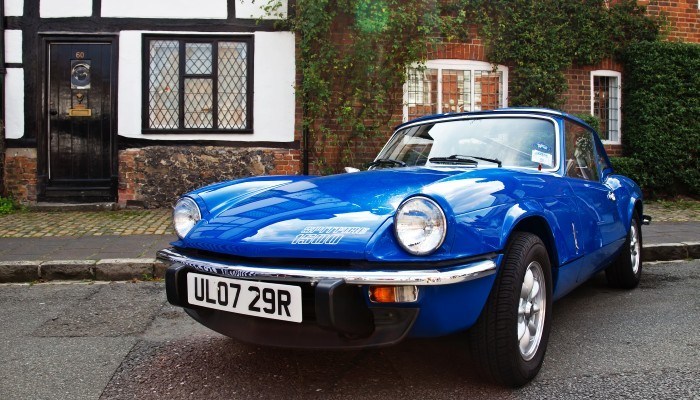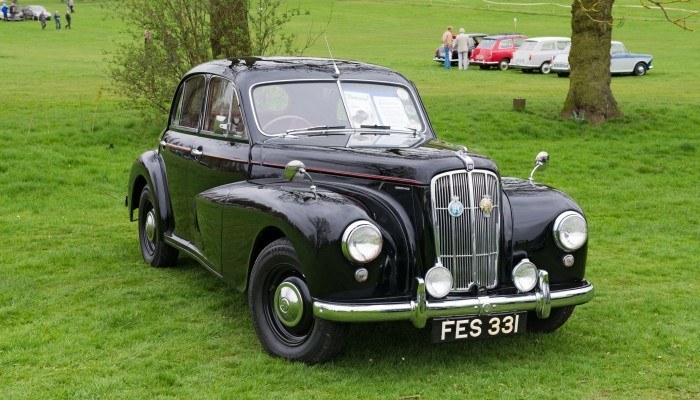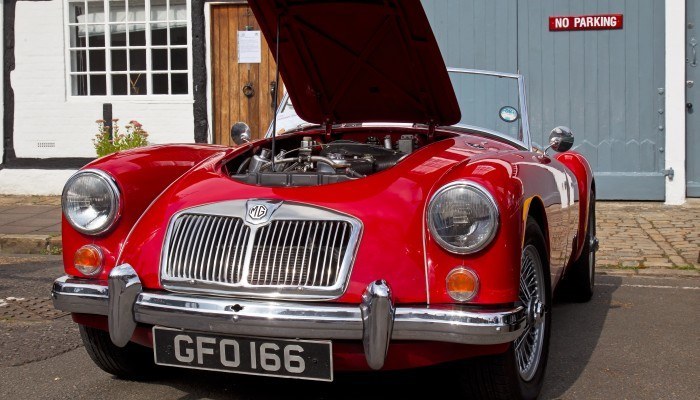When driving has become humdrum and chore-like, buying a classic car can promise to re-kindle automotive passions.
Driving and maintaining a car of 40+ years can be an all-consuming and visceral experience: keeping a classic car on the road requires physicality behind the wheel (no power steering or automatic transmission) and an in-depth understanding of what one’s chosen model will require over time.
- Which components are most vulnerable to defect?
- How to deal with the spectre of corrosion?
- How much does a vintage car cost to run compared to the average cost of running a car?
… These are some of the key questions to know the answers to when it comes to owning a classic car.
No matter how much of the maintenance of the classic car that you can undertake yourself, or how well you take care of your four-wheeled treasure, there is a financial cost to consider – very little of which is mitigated by the zero-rated Vehicle Excise Duty on cars built before 1982 (as of April 2022).

MG Spitfire (i4lcocl2/Bigstock.com)
Here we look at the key car running costs associated with buying and maintaining a classic car:
Buying a classic car
Buying a classic car for investment?
Choosing a classic car that will increase in value requires knowledge, foresight, and a little luck.
As far as most buyers are concerned, selling their car for a profit several years down the line would be an added bonus. What really inspires them is the simple pleasure of running and maintaining the machine.
Indeed, keeping a classic car locked away as an investment could do more harm than good. Like us humans, cars are designed to move and also like us, if they don’t, they deteriorate.

Morris Six (Royster/Bigstock.com)
Choosing a classic car: What do you want from a classic car?
What do you want from a classic car? Weekend jaunts? Top-down drives in the countryside?
Make sure you select a classic car that has the requisite reliability and design for your needs.
And those eyeing a convertible shouldn’t forget our summer is brief and often wet!
Model evolution
Be aware that a model can change significantly over its production run, with later models tending to iron out problems seen in older examples.
Modifications: Has the classic car been modified?
Classic cars that have not been modified and remain in good condition will cost more – since they are a rarity. Indeed, few cars survive 40 years of use without some modifications – often addressing recognised weaknesses in the given model.
Join a car owners’ club
As you begin to narrow your focus on the make and/or model of classic car you want to buy, joining the relevant car owners' club will garner more information; experienced owners are usually delighted to pass on their years of knowledge.
Car inspection service?
Modern car inspection services are not regarded as useful for classic cars. It is better to learn as much as possible about a model before you consider a purchase.
A knowledgeable friend may also be of significant use in determining if a classic car is worth buying or not.
Be sure to take any prospective car for a test drive first; although you may only be permitted to be a passenger for insurance reasons, you can listen for the tell-tale sounds of a worn driveline or suspension which would only add to the cost of running a car in future.
Despite the urge to get behind the wheel of your dream car, don’t buy the first car you see – a piece of advice often ignored!
Storage: Do you have appropriate storage for a classic car?
Cars built 40 years ago are very susceptible to corrosion, being primarily of steel construction.
It’s not advisable to keep your classic car outside in the wind and rain; if you don’t own a garage, consider renting one. Whilst this will add to the costs to run a car, it’s an investment worth paying for to maintain your classic. A council lock-up may represent the cheapest option – but these often have no lighting, making repairs difficult.
Insurers may require a classic car to be kept in a garage before they will provide cover.

MG (i4lcocl2/Bigstock.com)
Classic car running costs: How much does it cost to run a classic car?
Classic car repair costs
If you don’t know much about cars, consider doing a car maintenance course: paying a trained mechanic to complete simple maintenance tasks on a classic car is not cost-effective.
Spares: Are spare parts for the classic car readily available?
Consider how readily available spare parts are for your prospective classic car, as well as how much parts cost.
One advantage of classic cars over their modern counterparts is that there are far fewer components in them. However, with some models, obtaining these components can be challenging.
Fuel: Has the classic car been modified for available fuel?
Most classic cars have been modified to take unleaded petrol.
Bear in mind that older vehicles, including classic cars are not compatible with E10 fuel – the standard fuel sold in UK petrol stations and will continue to need E5 fuel, which has been maintained in the super petrol grade form of premium unleaded fuels.
Some cars built before 1992 cannot use 95 octane (E5) petrol . If a car has not been converted for unleaded petrol, there are three options (aside from conversion):
- See if the car can use unleaded without any major loss of performance – may be an option if trips are short.
- Use a proprietary branded additive – should prolong engine life as well as unleaded.
- Use leaded four-star petrol – a small percentage of fuel supplies are permitted for historic vehicles, but four-star stations are few and far between, often meaning that driving to them makes no logical sense.
Car insurance for classic cars
An insurance policy with an annual mileage limit (e.g. 3000-6000 miles) will cost a few hundred pounds.
Many classic car owners choose an 'agreed value' policy, which reflects the vehicle’s worth as a classic car – and not merely as scrap metal.
The applicable car owners' club may well be able to offer a valuation based on photos and a written description.
As mentioned above, an insurer may require the classic car to be kept in a garage.
Classic car breakdown cover
Whether you're looking to drive your classic car on a regular basis or less often, it's worth investing in appropriate classic car breakdown cover for older cars.
Buy classic car breakdown cover
More than A to B
Rather than just allowing you to enjoy the journey from A to B, the pleasure of owning a classic car also lies in getting it ready to leave point A in the first place.
The ongoing love and care demanded by a classic car is not to be underestimated – but then nor is the amount of fun you’ll have running your dream machine.




